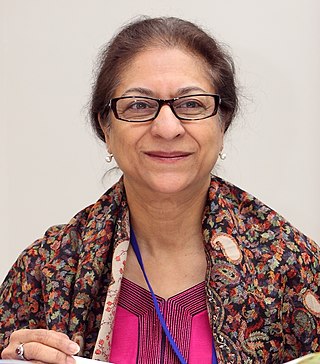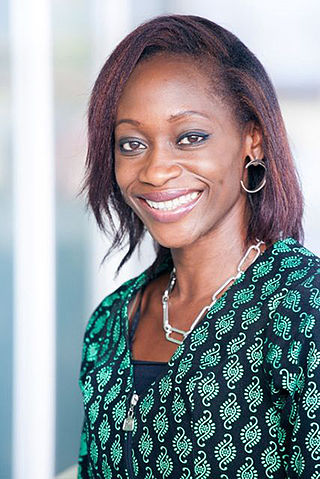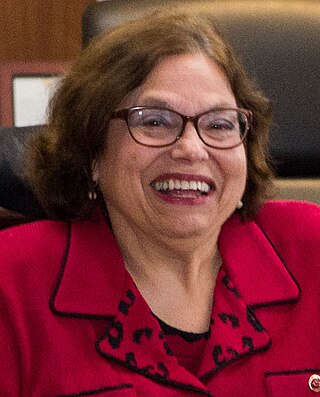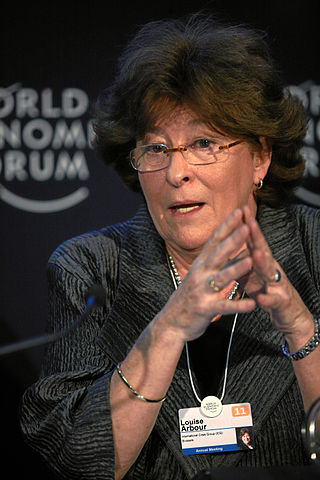
Asma Jilani Jahangir was a Pakistani human rights lawyer and social activist who co-founded and chaired the Human Rights Commission of Pakistan and AGHS Legal Aid Cell. Jahangir was known for playing a prominent role in the Lawyers' Movement and served as the United Nations Special Rapporteur on Freedom of Religion or Belief and as a trustee at the International Crisis Group.

The Center for Constitutional Rights (CCR) is a progressive non-profit legal advocacy organization based in New York City, New York, in the United States. It was founded in 1966 by Arthur Kinoy, William Kunstler and others particularly to support activists in the implementation of civil rights legislation and to achieve social justice.
Human rights in Thailand have long been a contentious issue. The country was among the first to sign the UN's Universal Declaration of Human Rights of 1948 and seemed committed to upholding its stipulations; in practice, however, those in power have often abused the human rights of the Thai nation with impunity. From 1977 to 1988, Amnesty International (AI) reported that there were whitewashed cases of more than one thousand alleged arbitrary detentions, fifty forced disappearances, and at least one hundred instances of torture and extrajudicial killings. In the years since then, AI demonstrated that little had changed, and Thailand's overall human rights record remained problematic. A 2019 HRW report expanded on AI's overview as it focuses specifically on the case of Thailand, as the newly government of Prime Minister Prayut Chan-o-cha assumes power in mid-2019, Thailand's human rights record shows no signs of change.

Hafsat Olaronke Abiola-Costello, in Lagos, is a Nigerian human rights, civil rights and democracy activist, founder of the Kudirat Initiative for Democracy (KIND), which seeks to strengthen civil society and promote democracy in Nigeria. She is President of Women in Africa Initiative (WIA), international platform for the economic development and support of African women entrepreneurs. She is also one of the founders of Connected Women Leaders (CWL).

Florynce Rae Kennedy was an American lawyer, radical feminist, civil rights advocate, lecturer, and activist.

Judith Ellen Heumann was an American disability rights activist, known as the "Mother of the Disability Rights Movement". She was recognized internationally as a leader in the disability community. Heumann was a lifelong civil rights advocate for people with disabilities. Her work with governments and non-governmental organizations (NGOs), non-profits, and various other disability interest groups, produced significant contributions since the 1970s to the development of human rights legislation and policies benefiting children and adults with disabilities. Through her work in the World Bank and the State Department, Heumann led the mainstreaming of disability rights into international development. Her contributions extended the international reach of the independent living movement.

Martha Wangari Karua is a Kenyan politician. She is a former long-standing member of parliament for Gichugu Constituency and an Advocate of the High Court of Kenya. She was Minister for Justice until resigning from that position in April 2009. She has consistently fought for the protection of women's rights and improvements to the democratic process.
The phrase women in business refers to women who hold positions, particularly leadership in the fields of commerce, business, and entrepreneurship. It advocates for their increased participation in business.

Ni Yulan is a civil rights lawyer in the People's Republic of China. She has established herself in defending human rights in China by providing legal aid to persecuted groups such as Falun Gong practitioners and victims of forced eviction.
Kalpana Hasmukhrai Rawal is a Kenyan-Asian lawyer and the former Deputy Chief Justice and Vice President of the Supreme Court of Kenya. She was sworn in on June 3, 2013 as the Deputy Chief Justice of Kenya in a ceremony presided over by the President of Kenya and the Chief Justice. After a protracted case on the question of the retirement age of Judges who were appointed under the old Constitution of Kenya, the Supreme Court delivered a Ruling which effectively set the retirement age at 70 years, sending the Deputy Chief Justice and one other Supreme Court Judge who had reached 70 on retirement.

Vrinda Grover is a lawyer, researcher, and human rights and women's rights activist based in New Delhi, India. As a lawyer, she has appeared in prominent human rights cases and represented women and child survivors of domestic and sexual violence; victims and survivors of communal massacre, extrajudicial killings and custodial torture; sexual minorities; trade unions; and political activists.

Alaa Murabit M.D. is a Libyan-Canadian physician, Meritorious Service Cross recipient, one of 17 Global Sustainable Development Goals Advocates appointed by the Secretary-General of the United Nations, and a UN High-Level Commissioner on Health Employment and Economic growth. In 2019 Murabit was selected as one of the Top 20 of the World's 100 Most Influential People in Gender Policy alongside Ruth Bader Ginsburg, Melinda Gates, and Michelle Obama. Murabit is the co-founder of The Omnis Institute, an independent non-profit organization that aims to work on critical global issues through the empowerment of emerging local leaders. She previously founded and spearheaded Voice of Libyan Women at the age of 21.

Women in law describes the role played by women in the legal profession and related occupations, which includes lawyers, paralegals, prosecutors, judges, legal scholars, law professors and law school deans.

Ayisha Osori is a Nigerian lawyer, author, international development consultant, journalist and politician known for her work on good governance, gender equality, women economic and political participation and ending violence against women in Nigeria. Her book Love Does Not Win Elections gives her insight into Nigerian politics. She is the former CEO of the Nigerian Women's Trust Fund. Olufunke Baruwa succeeded her.

Stella Nyanzi is a Ugandan human rights advocate, poet, medical anthropologist, feminist, queer rights advocate, and scholar of sexuality, family planning, and public health. She was arrested in 2017 for insulting the Ugandan president. In January 2022, she was accepted to live in Germany on a writers-in-exile programme run by PEN Germany, with her three children.
Abha Singh is an Indian activist and advocate currently practicing in the High Court of Judicature at Bombay. Her activism has focused on women's rights, gender equality, and justice.
Stellah Wairimu Bosire, is a Kenyan physician, corporate executive, human rights activist and author, a former co-executive director of Uhai Eashri and previously served as the chief executive officer of Kenya Medical Association and as the vice-chair of the HIV and AIDS Tribunal of Kenya.
Caroline Gillian Gooding was a British solicitor and activist for disabled people. She took up activism after having a stroke while in her early 20s. Gooding directed her efforts to publishing literature advocating a human rights-based approach to disability, advising, assisting and leading governmental disability commissions, and drafting government legislation to improve the status of disabled individuals, such as the Disability Discrimination Act 1995, the Disability Discrimination Act 2005 and the Equality Act 2010. The Caroline Gooding Memorial Lecture is named after the activist.

Martha Karambu Koome is a Kenyan advocate who is currently serving as the Chief Justice of Kenya, and is the first woman to occupy the post.













